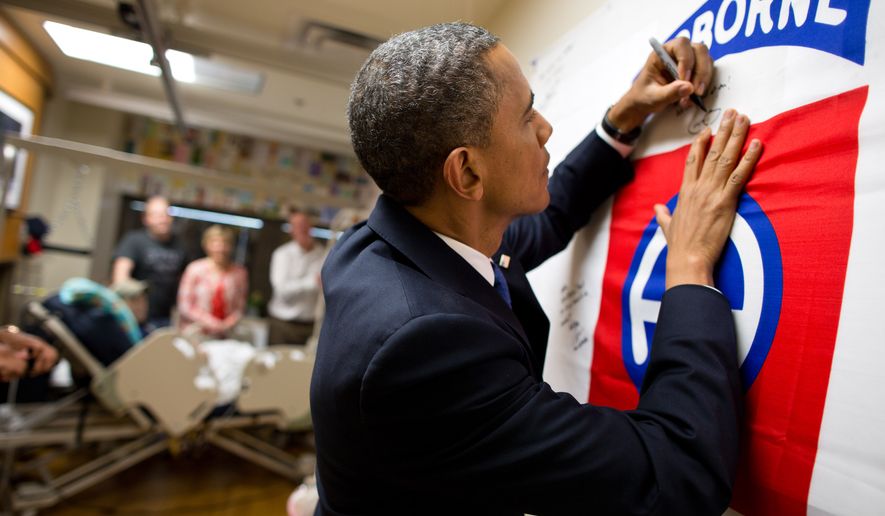The Obama administration received clear notice more than five years ago that VA medical facilities were reporting inaccurate waiting times and experiencing scheduling failures that threatened to deny veterans timely health care — problems that have turned into a growing scandal.
Veterans Affairs officials warned the Obama-Biden transition team in the weeks after the 2008 presidential election that the department shouldn’t trust the wait times that its facilities were reporting.
“This is not only a data integrity issue in which [Veterans Health Administration] reports unreliable performance data; it affects quality of care by delaying — and potentially denying — deserving veterans timely care,” the officials wrote.
The briefing materials, obtained by The Washington Times through the Freedom of Information Act, make clear that the problems existed well before Mr. Obama took office, dating back at least to the Bush administration. But the materials raise questions about what actions the department took since 2009 to remedy the problems.
In recent months, reports have surfaced about secret wait lists at facilities across the country and, in the case of a Phoenix VA facility, accusations that officials cooked the books to try to hide long wait times. Some families said veterans died while on a secret wait list at the Phoenix facility.
Last week, Dr. Robert Petzel, undersecretary for health in the Department of Veterans Affairs, resigned. His boss, Secretary Eric K. Shinseki, told Congress he will stay despite growing calls for his resignation.
PHOTOS: Top 10 U.S. fighter jets
Mr. Shinseki, a disabled veteran, has headed the department since the beginning of Mr. Obama’s first term, when the VA report identified many of the problems.
“Should they have known? Absolutely, they should have known,” said Deirdre Parke Holleman, executive director of the Washington office for the Retired Enlisted Association, a veterans group, which has not taken a position on whether Mr. Shinseki should resign. “These are problems that should have been dealt with.”
In particular, the 2008 transition report referred to a VA inspector general recommendation to test the accuracy of reported waiting times.
Such tests, the report noted, could prompt action if results reveal “questionable differences” between the dates shown in medical records and dates in the Veterans Health Administration’s scheduling system. It’s unclear whether that recommendation was adopted because VA officials have not responded to request for comment.
In Phoenix, officials are looking into whether as many as 40 veterans died while waiting for treatment, with “secret wait lists” used to conceal the delays. Speaking in the Republicans’ weekly address over the weekend, Sen. John McCain, Arizona Republican, said the scandal began in his home state but it has since “gone nationwide.”
“Altogether, similar reports of lengthy waiting lists and other issues have surfaced in at least 10 states,” he said.
PHOTOS: Eye-popping excuses in American political scandals
Acting VA Inspector General Richard J. Griffin told Congress last week that his office has opened multiple investigations into “reports of manipulated waiting times” in Phoenix as at other facilities.
He said his investigation also aims to find out whether officials in Phoenix purposely left off the names of veterans waiting for care on electronic waiting lists and, if so, whether any veterans died because of the delays in care.
Problems with electronic waiting lists also merited mention in the presidential briefing report.
“Audits of outpatient scheduling and patient waiting times completed since 2005 have identified noncompliance with the policies and procedures for scheduling, inaccurate reporting of patient waiting times and errors in [electronic waiting lists],” the briefing papers state.
Briefing reports typically are prepared by career federal employees before a change in power, giving incoming administrations detailed looks at agency operations. The VA report notes that little was done to address the problems surrounding scheduling and wait time accuracy during the George W. Bush administration.
“Although VHA has recognized the need to improve scheduling practices and the accuracy of wait times data, no meaningful action has been taken to achieve this goal today,” officials wrote.
In fact, officials added, nine recommendations arising from inspector general audits from 2005 to 2007 were not implemented by 2008 when officials prepared the report for the incoming administration.
Jim Nicholson, who served as VA secretary during the latter half of the Bush administration, could not be reached for comment.
The briefing materials do not reveal any concerns about outright fraud in manipulating waiting times, but they make repeated references in summarizing past audits and reviews about data accuracy.
“This report and prior reports indicate that the problems and causes associated with scheduling, waiting times and wait lists are systemic throughout the VHA,” officials told the incoming administration.
Testifying to Congress last week, Mr. Shinseki said most veterans are satisfied with their health care, “but we must do more to improve the timely access to that care.”
The American Legion has called on Mr. Shinseki and Allison Hickey, VA undersecretary for benefits, to resign.
“They are both part of VA’s leadership problem,” American Legion Commander Daniel Dellinger said in a statement Friday. “This isn’t personal. VA needs a fundamental shift in leadership if it is to defeat its systematic lack of accountability.”
• Jim McElhatton can be reached at jmcelhatton@washingtontimes.com.




Please read our comment policy before commenting.